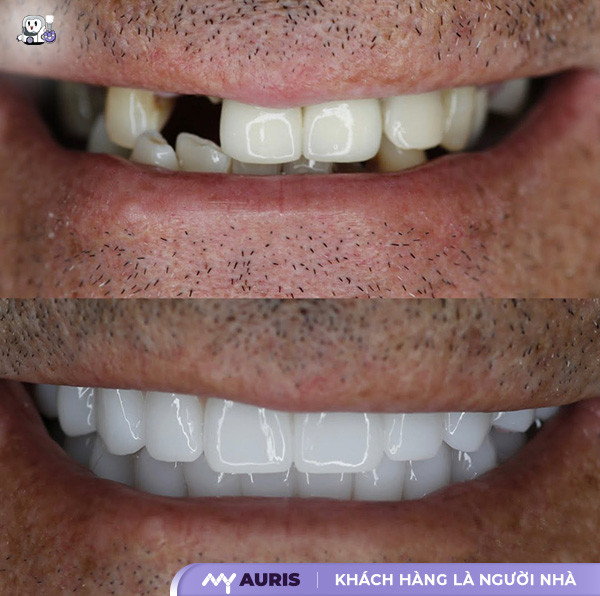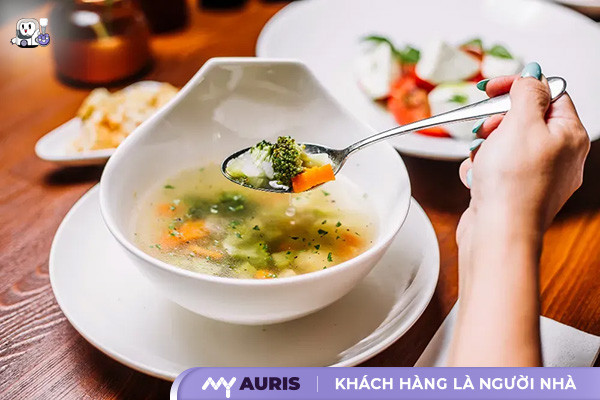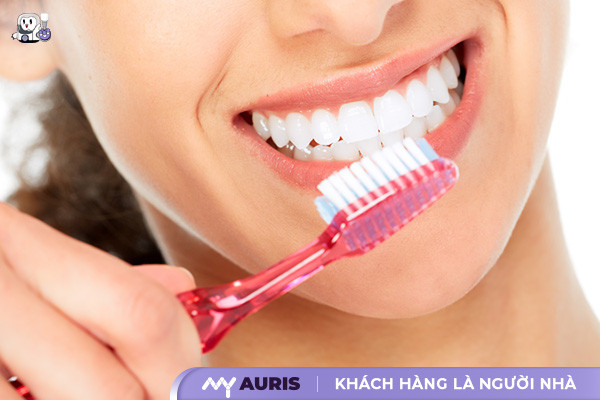After Implant placement, in addition to proper post-Implant oral hygiene, the post-Implant diet also plays a crucial role in the Implant healing process. A suitable nutritional regimen not only helps shorten recovery time but also ensures optimal restoration results. So, how long after dental implant placement can you eat normally? What foods should be avoided after Implant placement, and what food groups should be supplemented? Let’s explore the details with My Auris Dental Clinic in the article below!
How Long After Dental Implant Placement Can You Eat?
After Implant placement, many patients worry about post-Implant eating. So, how long after Implant placement can you eat, and what should you keep in mind?
According to dental specialists, after the Implant post is placed, you only need to fast for about 3-5 hours for the surgical site to stabilize. In the initial stage, prioritize soft, easy-to-swallow foods and avoid chewing directly on the newly restored area.
After approximately 3-6 months, when the Implant post has integrated with the jawbone, you can gradually resume normal chewing, even for harder foods. For a smooth recovery, follow the instructions from your specialist doctor and choose a reputable dental clinic.

What to Avoid Eating After Implant Placement? How Long Until You Can Eat?
After implant surgery, adhering to a proper post-implant diet helps the wound heal quickly, reduces complications, and protects the implant post. Below are the foods to avoid to ensure a smooth recovery process after implant placement.
Foods like hot soup, spicy hot pot, hot coffee, hot tea can dissolve blood clots quickly, exposing the implant site directly to high temperatures. This can cause prolonged pain and affect the integration of the implant post with the jawbone.
Foods like hard candy, cartilage, dried meat, hard bread… can create significant pressure when chewing, causing pain and even loosening the implant post. In some cases, eating excessively hard foods can lead to fractures or slow down the post-implant recovery process.
High-sugar foods like pastries, candies, carbonated drinks… can increase the risk of infection in the implant wound area. At the same time, overly acidic foods like oranges, lemons, pickled vegetables can irritate the mucous membranes, cause discomfort, and prolong healing time.
According to dentists, patients should avoid these foods for 1-3 months after implant placement. This helps the surgical site recover quickly, minimizes the risk of complications, and ensures optimal post-implant restoration results.

Diet After Dental Implant Placement
After dental implant placement, diet plays a crucial role in helping the implant post integrate stably and shortening recovery time. Below are the foods to prioritize according to dentists’ recommendations.
In the initial stage after dental implant placement, choose soft and liquid foods to limit chewing force on the newly restored area: Porridge, soup, mashed potatoes are easy to digest and rich in nutrients. Broth from stewed bones and tender meat supplements minerals, helping to strengthen the jawbone.
Drink at least 2 liters of water per day to support the recovery process. Additionally, supplement with: Fruit juice, vegetable juice, fresh milk to help the body better absorb essential vitamins and minerals.
Once the implant post begins to stabilize, you can increase food groups that help strengthen oral health: Vitamin C-rich fruits boost immunity and accelerate the healing process. Fiber-rich vegetables support gums and help the implant post integrate better. Eggs, fish, milk provide calcium, strengthening jawbone health.

Post-Dental Implant Care Instructions
After dental implant placement, in addition to a reasonable diet, you need to pay attention to the following important notes to ensure the implant post stabilizes and integrates quickly with the jawbone.
In the initial stage, absolutely do not chew directly on the gum area with the implant post, as this can cause implant displacement, prolonged bleeding, and even lead to implant infection. If the implant is rejected, you may have to undergo dental crown restoration from scratch.
Carefully observe for abnormal signs such as prolonged swelling, severe pain, or an allergic reaction to the implant material. If you experience any symptoms, contact your doctor immediately for examination and timely treatment.
Do not use your tongue or hands to push on the newly placed tooth, as this action can disrupt the jawbone integration process, prolonging recovery time. Limit habits such as teeth grinding or aggressively using toothpicks in the implanted area.
If you feel sensitivity or discomfort after dental implant placement, only use painkillers as directed by your doctor. Avoid self-medicating with over-the-counter drugs to prevent negative impacts on the implanted area.
Use a soft-bristled toothbrush to gently clean your teeth, avoiding strong pressure on the newly implanted gum area. Rinse your mouth with physiological saline to reduce bacteria and support the healing process. Use dental floss to remove food debris, reducing the risk of implant infection.
Regular follow-up appointments are crucial for the doctor to assess the recovery progress and determine the appropriate time to complete the dental crown restoration. If there are any abnormal signs, the doctor will provide timely treatment options.
Frequently Asked Questions About Dental Implants
In addition to important notes, many people still wonder about the diet and recovery process after dental implant placement. Below are common questions to help you better understand this method.

How Long After Dental Implant Placement Can I Drink Beer?
Patients should abstain from alcohol, beer, and alcoholic beverages for at least 4 weeks after implant placement. This is because alcohol and carbonation can slow down gum healing, increase the risk of infection, and negatively affect the jawbone and adjacent teeth.

Can I Eat Chicken After Dental Implant Placement?
Chicken is a chewy food that can put pressure on a newly placed dental implant. To avoid affecting the implant post, patients should cut chicken into small pieces, chew gently, and follow the doctor’s instructions to ensure safety.
How Long Does Dental Implant Placement Take?
The implant placement procedure typically takes 20-30 minutes, depending on the number and condition of each person’s teeth. Afterward, patients need to wait 3-6 months for the implant post to fully integrate with the jawbone, ensuring stability before dental crown restoration.
How Long Does It Take for a Dental Implant to Heal?
Typically, an implant post will need about 2-6 months to integrate with the jawbone and become stable. The recovery time, whether fast or slow, also depends on diet, lifestyle habits, and proper oral hygiene.
If you have any questions about dental implant placement, please contact My Auris Dental Clinic immediately via hotline 0906038017 for free consultation from our highly skilled doctors.





